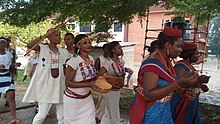
Back النساء في نيجيريا Arabic زنان در نیجریه Persian Mata a Najeriya Hausa Ụmụ nwanyị na Naịjirịa IG
This article needs additional citations for verification. (November 2021) |
 Nigerian women | |
| General Statistics | |
|---|---|
| Maternal mortality (per 100,000) | 630 (2010) |
| Women in parliament | 6.7% (2012) |
| Women over 25 with secondary education | NA |
| Women in labour force | 50% (2017)[1] |
| Gender Inequality Index[2] | |
| Value | 0.680(2021) |
| Rank | 168th out of 191 |
| Global Gender Gap Index[3] | |
| Value | 0.639 (2022) |
| Rank | 123rd out of 146 |
Women in Nigeria are a diverse group of individuals who have a wide range of experiences and backgrounds.[4] They are mothers, daughters, sisters, wives, entrepreneurs, professionals, and activists. Women in Nigeria face numerous challenges, including gender inequality, poverty, and a lack of access to education and healthcare.[5] Despite these challenges, Nigerian women are making strides in all areas of life and are becoming increasingly empowered to take control of their lives and their futures.[6]
| Part of a series on |
| Women in society |
|---|
 |
Nigeria's underdevelopment regarding the status of their women, due to a long history of colonial exploitation and oppression, has brought about a distortion of Nigeria's economic, educational, religious, cultural, social, ideological and social orientations.[7] Nigeria has a long history of gender inequality and discrimination against women. Women in Nigeria face a number of challenges, including limited access to education, health care, and economic opportunities.[8] Women are also disproportionately affected by poverty, violence, and other forms of discrimination. The Nigerian government has taken steps to address these issues, but progress has been slow. Women are still underrepresented in politics and decision-making roles, and they are often excluded from economic opportunities.[9] Additionally, traditional gender roles and cultural norms continue to limit the potential of women in Nigeria.[10] The social role of women in Nigeria varies according to religious,[11] cultural[12] and geographic factors. However, many Nigerian cultures see women solely as mothers, sisters, daughters and wives.[13][14] For instance, women in Northern Nigeria are more likely to be secluded in the home[15] than women in Southern Nigeria, who tend to participate more in public life.[16] In Southern Nigeria, widows experience different ill-treatment from their in-laws, which include forcing them to drink the remnant water after bathing the dead husband, sleeping on bare floor, wearing black gown, and denying them inheritance from the wealth of their deceased husband.[17] Modern challenges for the women of Nigeria include child marriage,[18] female genital mutilation,[19] rape,[20] and domestic violence.[21] Gender inequality in Nigeria is an ongoing issue, with the state ranking 168th out of 191 countries in the Gender Inequality Index.
- ^ "Labor force participation rate, female (% of female population ages 15-64) (Modeled ILO estimate) | Data".
- ^ "Human Development Report 2021/2022" (PDF). HUMAN DEVELOPMENT REPORTS. Retrieved 23 December 2022.
- ^ "Global Gender Gap Report 2022" (PDF). World Economic Forum. Retrieved 1 March 2023.
- ^ Nafiu, Akeem Tunde; Alogwuja, Unekwu Cynthia; Enimola, Dare Joseph (2021-01-16). "Exploring the Diversity within the Workplace of Small Firms in Kogi State, Nigeria". Facta Universitatis, Series: Economics and Organization (1): 329–341. doi:10.22190/FUEO200729024N. ISSN 2406-050X. S2CID 234262599.
- ^ Obayelu, Abiodun; Ogunlade, I. (2006-08-13). "Analysis of the uses of information communication technology (ICT) for gender empowerment and sustainable poverty alleviation in Nigeria". International Journal of Education and Development Using ICT. 2 (3): 45–69. ISSN 1814-0556.
- ^ "Empowering the Third Billion: women and the world of work in 2012 | VOCEDplus, the international tertiary education and research database". www.voced.edu.au. Retrieved 2023-03-14.
- ^ Ihonvbere, Julius Omozuanvbo (1994-01-01). Nigeria: The Politics of Adjustment and Democracy. Transaction Publishers. ISBN 978-1-4128-2975-5.
- ^ Omoju, Oluwasola E.; Abraham, Terfa W. (2014-03-24). "Youth bulge and demographic dividend in Nigeria". African Population Studies. 27 (2): 352–360. doi:10.11564/27-2-480. ISSN 2308-7854. S2CID 154675695.
- ^ Eni, Onyekachi; Nnam, Macpherson Uchenna; Udu, Eseni Azu (2022-06-23). "The Right to Participate in Political and Decision-Making Process under the Maputo Protocol: Normative Masculinity and Nigerian Women". The Age of Human Rights Journal (18): 397–423. doi:10.17561/tahrj.v18.6633. ISSN 2340-9592. S2CID 250007906.
- ^ F. Adetowun Ogunṣhẹyẹ (1988). Nigerian women and development. Ibadan, Nigeria: Ibadan University Press. p. 5. ISBN 978-121-219-5. OCLC 21334024.
- ^ Mitchell, Travis (2016-03-22). "7. Theories explaining gender differences in religion". Pew Research Center's Religion & Public Life Project. Retrieved 2022-12-12.
- ^ Andrews, Dr Shawn. "Council Post: How Culture Impacts Our Value Of Women". Forbes. Retrieved 2022-12-12.
- ^ Sibani, Clifford (July 2017). "Gender Inequality and its Challenge to Women Development in Nigeria: The Religious Approach". Unizik Journal of Arts and Humanities. 18 (2): 432–449. doi:10.4314/ujah.v18i2.25.
- ^ Agbasiere, Joseph Thérèse (22 December 2015). Women in Igbo life and thought. Routledge. ISBN 978-1-136-35893-7. OCLC 933433211.
- ^ Usman Al-amin (22 November 2018). "Gender and Religion in Nigeria: The Role of Northern Nigerian Muslim Women in National Development" (PDF). Journal of Science, Humanities and Arts. 5 (9): 1–22. doi:10.17160/josha.5.9.503. Archived from the original (PDF) on 2020-11-11.
- ^ Afolabi, Comfort Yemisi (2019). "The Invisibility of Women's Organizations in Decision Making Process and Governance in Nigeria". Frontiers in Sociology. 3. doi:10.3389/fsoc.2018.00040.
- ^ "Property inheritance: Widows' endless battle against oppression, search for equity". Punch Newspapers. 2022-10-29. Retrieved 2023-01-01.
- ^ "Atlas".
- ^ Okeke, T.; Anyaehie, U.; Ezenyeaku, C. (2012). "An Overview of Female Genital Mutilation in Nigeria". Annals of Medical and Health Sciences Research. 2 (1): 70–73. doi:10.4103/2141-9248.96942. PMC 3507121. PMID 23209995.
- ^ "Rape Culture - Women's & Gender Center". www.marshall.edu. Retrieved 2022-12-12.
- ^ "Nigeria: Domestic Violence - Nigerian Women At Risk". allAfrica.com. 2022-04-26. Retrieved 2022-05-25.
© MMXXIII Rich X Search. We shall prevail. All rights reserved. Rich X Search